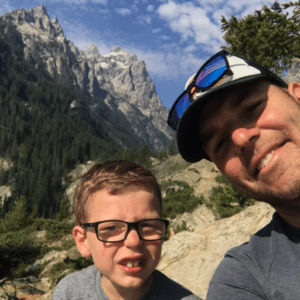
My son was born healthy but contracted HSV1 Encephalitis at eight months old. This caused structural, stroke-like damage to the left side of his brain. At 20 months, he developed Infantile Spasms, which were controlled in a few weeks after titrating up to a massive dose (much larger than the 150mg/kg original “max”) of Vigabatrin. Approaching his 4th birthday, he began having uncontrolled focal seizures. After adding meds, increased dosages, and a special diet, nothing seemed to work for long. He had a left posterior quadrant resection (TPO) at the Cleveland Clinic at 4.5 years of age. Three and a half years later, he is still seizure-free and on just one med (Vimpat). Clinically, all things considered, he is doing quite well in a second-grade general education class. He is reading at grade level, enjoys doing puzzles, riding his bike & scooter, and plays hockey as part of the West Michigan Special Hockey Association. The journey has been a roller-coaster ride: many ups and downs, much hard work, diligence, and an ongoing process of learning about and advocating for things related to both his health and future success.
Raising a child with epilepsy, in the process of considering epilepsy surgery, and navigating life post epilepsy surgery is quite the journey. I’ve walked all 3 of those roads, and while each of those will be different for each child/family, none are easy. That said, having been there has impacted my life in ways I can’t even begin to articulate – including how I view the world and the people around me, priorities in my life, and what it means to step into some pretty dark valleys in someone else’s life.
Of the three roads mentioned above, the first 2 had some stretches that were very dark and lonely. “Lost” is probably the best single word to describe it. Looking for answers for your child, trying to put one foot in front of the other with the rest of life’s demands (marriage/parental relationship, work, other kids)….when nobody around you has any idea of what walking in your shoes is like, as they aren’t capable of it. To some extent,on these first two roads, I wished I would have had peer support and someone to talk to that could truly empathize with me, having walked similar roads before. I found this, informally, via different Facebook groups where I’d very intermittently connect with someone over a question. A “go-to” peer supporter during these first two legs of the journey would have been immensely helpful…and who knows, we may have known to pursue surgery or go to the Cleveland Clinic more quickly had we been connected.
The last road – navigating life post-surgery for my son – has no end and is something we need to prepare the way for even after my wife and I are not around. The benefit of the Peer Support network we have and the resources and research done through this organization is unquantifiable for anyone at any place on this journey. It has helped me become aware of potential areas of concern (CAPD, potential endocrine issues), as well as navigating and advocating for my son’s educational needs at school and via the IEP process.
I am eager to be a peer supporter because I know how much a stronger support system would have, and has, meant to me when I was walking the different roads of this journey. I feel called to step into the difficult places in the lives of others and walk with them in whatever little way I can. The epilepsy surgery journey is one I have rather unique insight into. Having walked it before myself, I have a good sense of the way forward. More importantly, I can listen and understand in a way that most people in the life of someone on this journey simply cannot. Lastly, and while I am happy to walk with anybody on this journey, I believe there are other dads out there that don’t have a person to talk to and carry a heavy burden on their shoulders. Some may not be comfortable talking to a female Peer Supporter, but hopefully, the presence of (another) male peer supporter is helpful to other fathers on this epilepsy surgery journey.
Languages spoken: English
